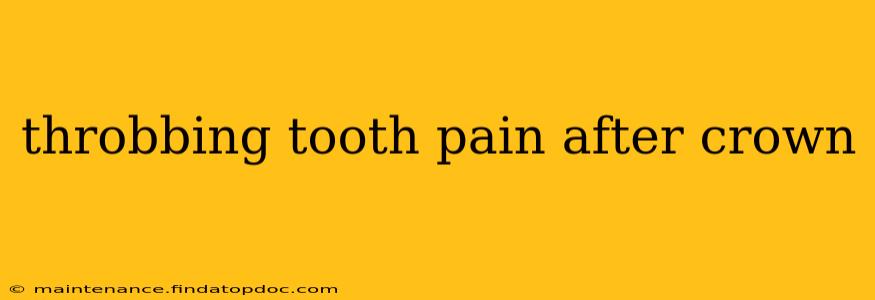Experiencing throbbing tooth pain after getting a crown is understandably distressing. While a crown is designed to protect and restore a damaged tooth, sometimes complications arise. This comprehensive guide explores the potential causes of this pain, effective treatment options, and preventative measures to minimize the risk.
Why Does My Tooth Still Hurt After Getting a Crown?
This is a common concern among patients. Several factors can contribute to throbbing tooth pain after crown placement:
-
Irritation: The initial irritation from the crown itself can cause temporary sensitivity and throbbing pain. The tooth may be slightly inflamed from the procedure, and the crown's presence can exacerbate this. This usually subsides within a few days.
-
Infection: A bacterial infection under the crown (periapical abscess) is a serious concern. If the infection is already present before the crown is placed, it may worsen or become trapped. Symptoms often include intense throbbing, swelling, and possibly fever.
-
Pulpitis: Inflammation or infection of the dental pulp (the soft tissue inside the tooth) can lead to persistent pain, even after a crown. This could be from pre-existing damage or trauma not fully addressed before crown placement.
-
Sinus Issues: Pain originating from the sinuses can sometimes be misattributed to tooth pain, especially in the upper teeth. Sinus infections can cause pressure and throbbing sensations that mimic a dental problem.
-
Crown Issues: Problems with the crown itself, such as a poorly fitted crown, an improperly cemented crown, or a cracked crown, can lead to pain and discomfort.
-
Gum irritation: Irritation or inflammation of the gums around the crown can also lead to pain. Poor oral hygiene or an allergic reaction to the cement used can contribute to this.
What to Do if Your Tooth Hurts After a Crown?
Immediate Actions:
-
Contact your dentist: Don't delay! Report any significant or persistent throbbing pain to your dentist immediately. They can assess the situation and determine the cause.
-
Over-the-counter pain relief: Take over-the-counter pain relievers like ibuprofen or acetaminophen to manage the pain until you can see your dentist. Avoid aspirin, as it can thin the blood.
-
Gentle rinsing: Rinse your mouth gently with warm salt water to help keep the area clean and reduce inflammation.
How is Throbbing Tooth Pain After Crown Placement Treated?
Treatment depends on the underlying cause. Your dentist will conduct a thorough examination, including X-rays if necessary, to diagnose the problem. Possible treatments include:
-
Root canal: If the pulp is infected, a root canal may be required to remove the infected tissue and prevent further damage.
-
Crown adjustment or replacement: If the crown is ill-fitting or damaged, it may need to be adjusted or replaced.
-
Antibiotics: If an infection is present, antibiotics may be prescribed to combat the bacteria.
-
Pain management: Your dentist may prescribe stronger pain medication for more severe pain.
Can Throbbing Tooth Pain After a Crown Be Prevented?
While some complications are unavoidable, taking preventative measures can significantly reduce the risk:
-
Good oral hygiene: Maintaining excellent oral hygiene, including regular brushing, flossing, and rinsing, is crucial.
-
Regular dental checkups: Regular checkups and cleanings allow your dentist to detect and address potential problems early.
-
Careful crown selection and placement: Choosing a qualified and experienced dentist for your crown placement is important to ensure proper fitting and placement.
-
Following post-procedure instructions: Carefully follow your dentist’s post-procedure instructions for cleaning and care.
What if the Pain is Severe or Doesn't Improve?
If the throbbing pain is severe, doesn't improve after a few days, or is accompanied by swelling, fever, or other concerning symptoms, seek immediate dental attention. Prompt treatment is essential to prevent serious complications.
Is it Normal to Have Some Discomfort After a Crown?
It's common to experience some mild discomfort or sensitivity after getting a crown, especially in the first few days. However, persistent or severe throbbing pain is not normal and should be addressed by your dentist immediately.
How Long Does it Take for Tooth Pain After a Crown to Go Away?
The duration of post-crown pain varies. Mild discomfort typically subsides within a few days. However, if the pain is related to a more serious issue like an infection, it may take longer to resolve and require professional treatment. Your dentist can provide a better estimate based on your specific case.
This information is for general knowledge and does not constitute medical advice. Always consult with your dentist for diagnosis and treatment of any dental concerns.
